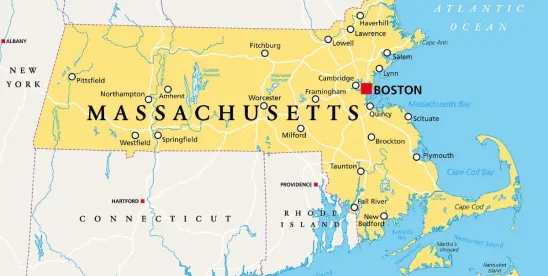| Go-To Guide: |
|
On June 13 in Clark v. Attorney General, the Massachusetts Supreme Judicial Court allowed an initiative petition relating to restaurant service workers to appear on the November 2024 ballot. Currently, the minimum wage paid to wait staff, other service employees, and bartenders is $6.75 per hour. This wage is known as the “service rate” (or the “tipped wage”). The petition1 would raise the “service rate” from $6.75 per hour to the full minimum wage (currently $15 per hour) over five calendar years, beginning Jan. 1, 2025. The petition will appear as a question on the November ballot in light of the petition’s proponents gathering the final round of signatures necessary under Article 48 of the Constitution.2
Thus, it is important for restaurant owners, proprietors, and managers to understand and prepare for the possible adoption of that ballot question.
Impact on Wages and Tips
The ballot question would increase the “service rate” from $6.75 to the full $15 minimum wage3 over five years in the following increments:
- 64% of the $15 minimum wage (or $9.60) for 2025;
- 73% (or $10.95) for 2026;
- 82% (or $12.30) for 2027;
- 91% (or $13.65) for 2028;
- 100% for 2029.
Until the service rate reaches 100% of the minimum wage, the current rule that requires employers to ensure that tipped employees receive at least $15 per hour ($6.75 service rate plus tips) would continue to apply, with employers needing to make up any shortfall.
However, the petition would eliminate the current requirement that this calculation of the difference between the service rate and the full minimum wage be made “at the completion of each shift worked by the employee” (M.G.L. ch. 151, sec. 7) effective Jan. 1, 2025.
Other Impacts
The initiative petition also proposes a significant change to the use of a tip pool in restaurants with service employees. Currently, only “wait staff employees,” “service employees,” and “service bartenders,” sometimes referred to as “front of house” employees, are eligible to participate in a tip pool. MGL ch. 149, sec. 152A. The petition, if approved, would authorize an employer to include “back of house” employees who are not eligible to receive tips in a tip pool under current law, as long as all employees are paid the full minimum wage (currently $15). Sharing tips with managers and supervisors would remain prohibited. M.G.L. ch. 149, sec. 152A(c); see also 29 U.S.C. § 203(m)(2)(B).
The ballot question does not contain language that would seek to reconcile the change described above with the current provision in the minimum wage statute that “this paragraph shall not be construed to prohibit the pooling of tips among employees who customarily and regularly receive tips.” M.G.L. ch. 151, sec. 7 (emphasis added). If the ballot question is adopted, the attorney general’s office and Department of Labor Standards could seek to address this apparent conflict by regulation or by interpretive guidance.
Procedure, Effective Dates, and Preparation
If approved by voters, the legislation proposed in the ballot question would take effect Jan. 1, 2025, except for the phased-in increases in the service rate, which would take effect according to the schedule described above. Thus, on Jan. 1, 2025 (less than two months after the November election):
- The service rate would increase to $9.60;
- Employers would no longer need to calculate the additional amount of tips needed to achieve $15 per hour on a “per-shift” basis; and
- Participation in a tips pool could be expanded to “back of house” employees, but not to managers or supervisors.
Given this compressed timeframe, restaurant owners and managers should consider:
- reviewing their payroll systems now and identifying how to adjust to the provisions of the ballot question;
- working with their payroll processors, if any, to prepare for the possibility of these changes becoming law, including an understanding of the necessary steps and a timeline for those steps;
- deciding whether to expand participation in a tips pool, and if so, how and when that change would be implemented;
- Creating a communication strategy for employees who may have questions about changes in the law, and preparing to train employees should the ballot question pass; and
- Consulting with legal counsel regarding compliance with these potential state law changes and compliance with federal law regarding tip pooling.
In planning for these potential changes, restaurant owners and managers should note that Dec. 31, 2024, is a Tuesday, and Jan. 1, 2025, is a Wednesday. Because these days fall in the middle of the week and in the middle of a pay period, restaurant owners will have less time than they might wish to make the necessary changes.
There may be efforts for and against the changes proposed by the ballot question ahead of the November election, e.g., the Massachusetts Restaurant Association has articulated opposition to its passage. But the timeline proposed in the ballot question suggests that prudent preparation by restaurant owners and managers may help prevent disruption over the busy holiday season, in the event the ballot question passes.




 />i
/>i

